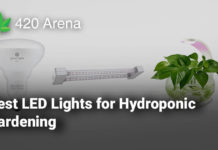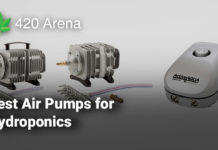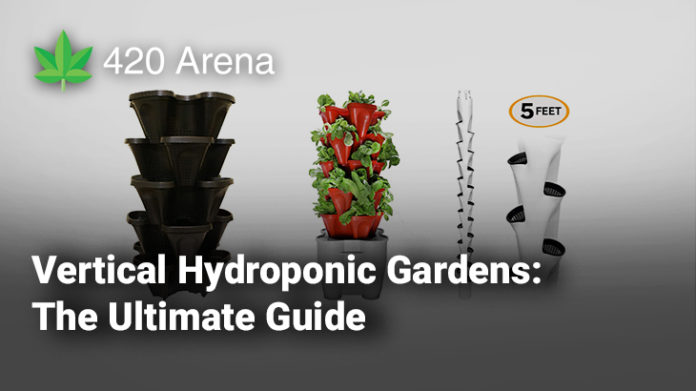Modern-day growers have found many different ways in which they can grow their weed. Some growers continue to grow it the traditional and old-fashioned way of growing it outdoors where nature’s elements help boost the growth of the plant, while others have moved indoors where they can get a better control over the factors that promote growth. However, hydroponic growth is something that has been catching on at quite a pace and growers – especially those short of water or space – now prefer to grow their plants using hydroponics. In this article, we shall be talking about a specific type of hydroponic growth – vertical hydroponic gardens.
Instead of growing your plants the typical horizontal way, here you stack them upon each other with each ‘floor’ of the garden having multiple plants. However, more on this as we proceed into the article. Before we get to the point that we can talk about vertical hydroponic gardens, we will first need to discuss at length what hydroponics is, what are the benefits of using a hydroponic system and what are some demerits of the same too.
After that, we shall then take a closer look at what vertical hydroponic gardens are – who are they meant for, and what are the different kinds of hydroponic setups out there! We hope that this article helps you understand this type of gardening system in a better manner and acts as the ultimate guide to vertical hydroponics for you.
Hydroponics 101: What is Hydroponic Growth?
In order to understand how hydroponics works, you should know what the other alternative is. Typically, soil-based growth is something that has been practiced by growers for a long time. You plant a seed in a pot full of soil and then keep adding water, nutrients, light, air to it till it grows into a flowering plant. However, in the case of hydroponic growth – you remove one element: soil.
Instead of soil, there emerge multiple methods to grow your plants – this could be directly providing water to the roots of your plants, or it could be via a non-soil medium such as peat moss or Rockwool cubes among others. Hydroponics removes the soil element from the mix and focuses more on the water part. Here, water infused with nutrients is provided directly to the roots of the plants – meaning that they no longer need to exert pressure on the roots to seek water and nutrients as it reaches the roots directly. Since that whole searching part is eliminated and direct access is provided the nutrients reach the plants faster as well as in larger quantities than soil-based growth because soil tends to absorb and retain some nutrients for itself.
Hydroponic growth is not a new concept but is actually something which is making a resurgence – especially for the household grower. As a concept, it has been around for a really long time. So long that the ancient ‘Hanging Gardens of Babylon’ were nothing but a giant hydroponic garden! The Babylonians had mastered the art thousands of years ago and it is now reaching our homes. The journey from outdoor growth to indoor growth was a leap forward for gardening and from indoor growth to hydroponic growth is going to be another major leap forward. At the moment, hydroponics is something that is seen as something that “pro growers” do, however that dynamic is quickly changing and we hope that this guide on vertical hydroponic gardens inspires you to start with your own hydroponic growth process.
What are the benefits of growing plants hydroponically?
The first question that many people have when someone tells them to switch from growing on soil-based mediums to growing their plants hydroponically is – what are the benefits of doing so? Why should I switch away from my comfort zone into something I have never done before? The simple answer to this is that you are rewarded more while lesser resources are utilized which is quite a great situation!
Hydroponic growth harnesses the power of water (hydroponics itself means ‘the labour of water’ in Latin) to grow plants. As we eliminate soil from the mix, nutrients can be accessed faster by the plants, and hence the growth is also faster and the plants tend to grow bigger and provide you with a higher yield than before. Furthermore, hydroponic growth saves your plants from a number of soil-borne diseases which are commonly found in plants. Moreover, when you eliminate soil from the mix, you also eliminate the chances of excess nutrient deposits at the roots which block the entry of water (which you would otherwise have to resolve by flushing the soil).
Moreover, hydroponic growth is great for growers who are growing their plants in an area where they are short on the water supply because the water that you put in your hydroponic reservoir can be reused for as long as a week before you throw it away for fresher water.
What Are Vertical Hydroponic Gardens?
Vertical hydroponic gardens are basically a type of hydroponic setup where plants are stacked one on top of the other instead of being stacked side-by-side as we have seen in older and conventional layouts. That is the key differentiating aspect which helps the growers save on space and that is the biggest advantage that lures them towards using such a setup.
In a vertical hydroponic garden, there’s basically one reservoir in which water mixed with nutrients is stored. The reservoir is usually placed in the bottom while a towering structure emerges from it which has a tubing inside. The tower has various levels or floors where multiple plants would be planted (for instance 5 levels of four plants each). Each plant would have direct access to water via tubing and the reservoir would pump the water up while the excess water would be drained back into the reservoir thereby making it a structure suitable for the growth of plants.
What Are The Benefits of Vertical Hydroponic Gardens?
People don’t really shift from one method of growing to another unless they see a clear benefit in them. When it comes to vertical hydroponic gardens, there are a number of benefits that growers could avail out of it. Here’s a look at why growers should make use of such a system of growing their plants:
The biggest of these benefits is that such a system is a HUGE space-saver. Having your plants stacked vertically means you can grow a much larger number of plants in the same surface area as they are not growing side by side but one on top of the other. This is perfect for those growers who are growing in a small garden or have a limited growing area. Furthermore, this also saves a ton of water making it an ideal setup for growers who are growing their plants in regions where water supply is low and water needs to be reused. Mathematically speaking, this model of growth pays of better because of the high yield per area that you get with vertical hydroponic gardens. These are easy to move around and can be shifted between indoors and outdoors areas without much of a hassle.
Top 3 Best Vertical Hydroponic Systems for Growing Marijuana
No products found.
There are a number of different systems of vertical hydroponic growth that you can buy in the markets. However, these are the three most trusted and popular options that you can get hold of:
1. Mr. Stacky Smart Farm with Automatic Self Watering Garden
No products found.
Mr Stacky is among the best known brands when it comes to vertical hydroponic garden kits. This is a smart-tower from the company which comes with an automatic system for watering which makes the jobs of the growers easy! You can set a timer and the water supply will be provided as per that. There’s a 16 gallon tank in this planter which can last you for two to three weeks (though we recommend changing water every week). If you were ever to go somewhere you can automatically program it for watering. There are five floors on this planter, each with four pots – giving you a total of 20 plants in this entire setup. It is quite compact as well as easy to move around.
Check Price & Reviews on Amazon
2. SuiteMade PVC Vertical Grow Tower 5ft
No products found.
SuiteMade’s PVC vertical grow tower is another very popular option for hydroponic growers looking for a tower setup. This one is quite a good looking planter which looks straight out of some futuristic movie set. This is the five feet variant (though a four feet variant can also be bought off the same page). You can plant twenty plants on this setup. The manufacturer claims that growing your plants in this setup will get you around 5x better growth than compared to regular growing. Apart from the regular setup you also get a hanging chain which will allow you to hang this setup to give it an even better look in your garden. Lastly unlike many other similar products which are made in China or similar regions, this is made in the US and offers a high-quality performance as well as durability.
Check Price & Reviews on Amazon
3. Mr Stacky 5 Tier Vertical Garden Tower
No products found.
Our third and final product in this list of the best vertical hydroponic towers is another product from Mr Stacky, which is a five tier system with four pots on each level. This gives you a space for twenty plants at a very affordable price point of just $30. This is also quite portable, a little over 2 feet in height. Water can easily flow and drain out thanks to the holes on the bases and when not in use you can stack it all together and keep it aside. The ‘floors’ fit into each other really well and can save quite a bit of space! This is an easy setup and an ideal product for first-time marijuana growers.
Check Price & Reviews on Amazon
Understanding the Different Vertical Hydroponic Setups
Now that you know everything that there is about hydroponic growth and what vertical hydroponics is, you also need to know a little something about the different kinds of hydroponic systems that are out there:
1. Basic Stacked Setup (Vertical Tower Setup)
This is the most common and the most popular option when it comes to vertical garden setup. This is the most widely used setup and the three products that we have mentioned above all follow this pattern. This is also the simplest to use. Here, there’s a reservoir in the bottom and there are multiple levels all along the central pipe (the tower) from which water outlets provide water to all levels. There are multiple plants on all levels. This is easy to use and easy to maintain.
2. A-Frame Vertical Hydroponic Garden Setup
For those who have somewhat of a bigger garden and are willing to get your hands in on some DIY stuff, an A-Frame garden is a great option for you. You will first need to get some wood and have it arranged in the A-Frame format (somewhat like a triangular tent – but with wooden frames). On the central spaces, you could add more planks with more pots and then have PVC pipes run all through these frames which will provide water to the plants. This is quite a space saver and can hold a lot of plants in one setup.
3. Zig-Zag Vertical Hydroponic Garden Setup
The Zig-Zag vertical hydroponic garden setup is a little bit of an improvement over the A-frame setup. Here, the pipes and tubings will be arranged in such a manner that the water will flow down on its own. Here, you don’t have an A-frame but a typical rectangular frame with the pipe coiling around it in a zig-zag manner like a snake. Here you can have the plants growing in the PVC pipes itself with the tubes constantly providing running water through them. This is slightly complex but works well for saving even more water.
Frequently Asked Questions About Vertical Hydroponic Gardens
Here are the answers to some of the most common and frequently asked questions by growers when it comes to vertical hydroponic gardens and growing weed using them:
1. What are the disadvantages of vertical hydroponic gardens?
Using a vertical hydroponic system has a number of benefits but there also exist certain disadvantages which growers need to know about. First off, it is a time-consuming process as you have to set it upright and you need to ensure that it is getting enough light, all the angles are rightly placed and that the water is being replaced on a timely basis. Then there’s quite a bit of electric consumption as you need a strong pump to channel the water upwards against the flow of gravity which might consume quite a bit of power.
Hydroponic systems, particularly the vertical ones, need more light – considering that there are plants stacked on top of each other you need to angle the lights in such a manner that every level of your vertical hydroponic tower is getting sufficient lighting. All of this needs to be taken care of by the grower, which is why it can be quite a challenging task for those who are doing it for the first time.
2. Who is this kind of system meant for?
Anyone can use this system of growth to grow their marijuana plants but it is particularly beneficial for those growers who are growing their weed in regions where there is a shortage of water or shortage of space – these are the growers who will benefit the most out of it.
3. Where can we buy vertical hydroponic setups?
Vertical hydroponic setups are easily available and are found in almost every gardening shop. They can also be found in supermarkets and other speciality stores. You can also buy them off Amazon or other online portals. We have provided the link to some of the best such products in our list above. Do go through them and make sure you’re getting the right tower for your plants.
Conclusion
Growing weed (or any other kind of plants) is a process that needs to be carried out rather meticulously and procedures need to be followed. When you bring hydroponics into the mix, it gets a little more complex and when you bring vertical hydroponic gardens into the picture – it might get a little daunting, especially if you are someone who hasn’t grown much in the past. However, we hope that going through this ultimate guide on vertical hydroponics has helped you understand the system in a better manner and has given you a detailed idea about the nuances of such a method of gardening. If any questions still persist, feel free to drop us an email or let us know in the comments section and we shall get back to you as soon as possible. Till then…
..Happy Growing! 🙂
Table of Contents

















![How to Use Carbon Filters in Your Grow Room [7 Best Carbon Filters for Grow Rooms in 2021] How to Use Carbon Filters in Your Grow Room](https://420arena.com/wp-content/uploads/2020/12/How-to-Use-Carbon-Filters-in-Your-Grow-Room-218x150.jpg)










